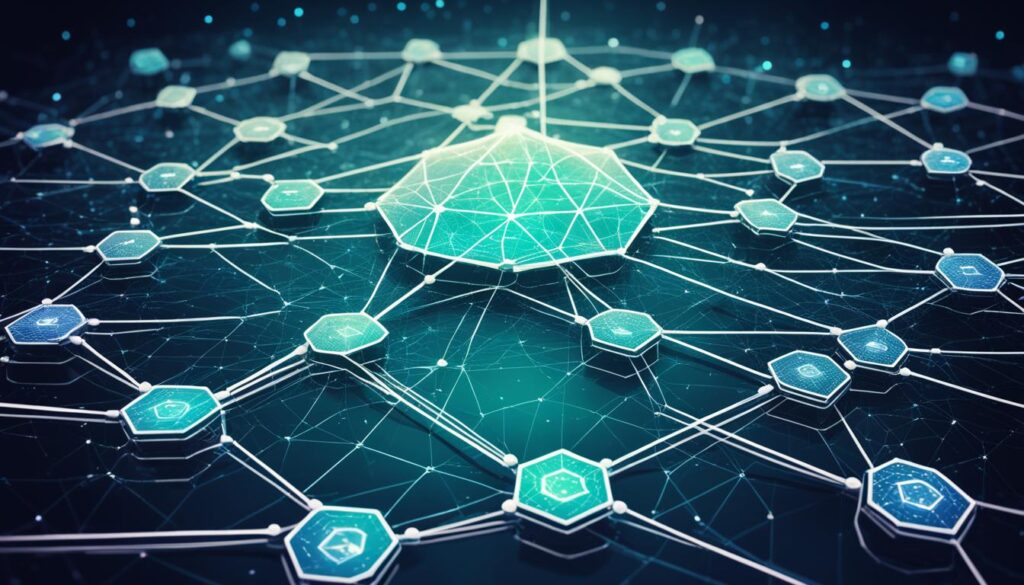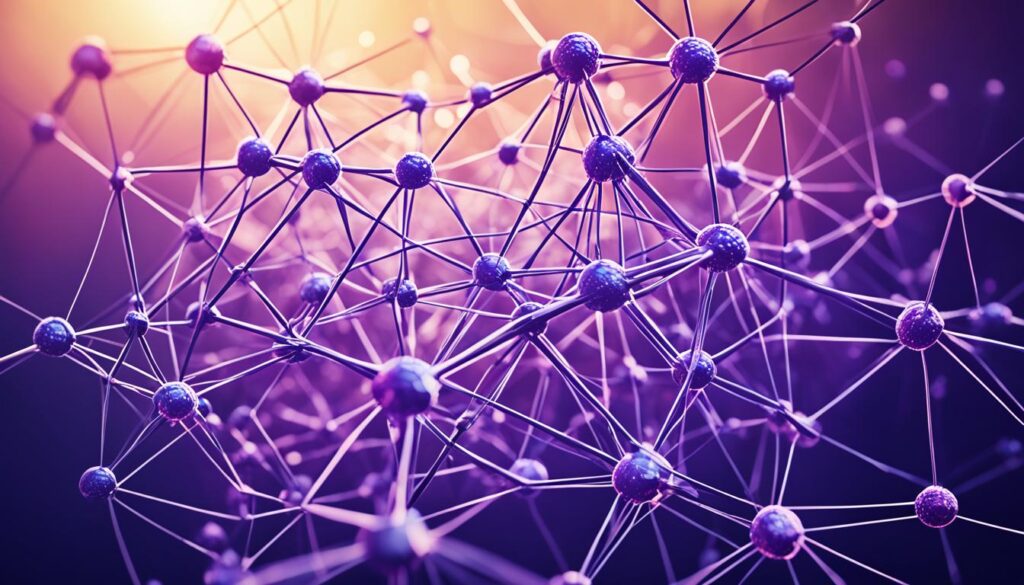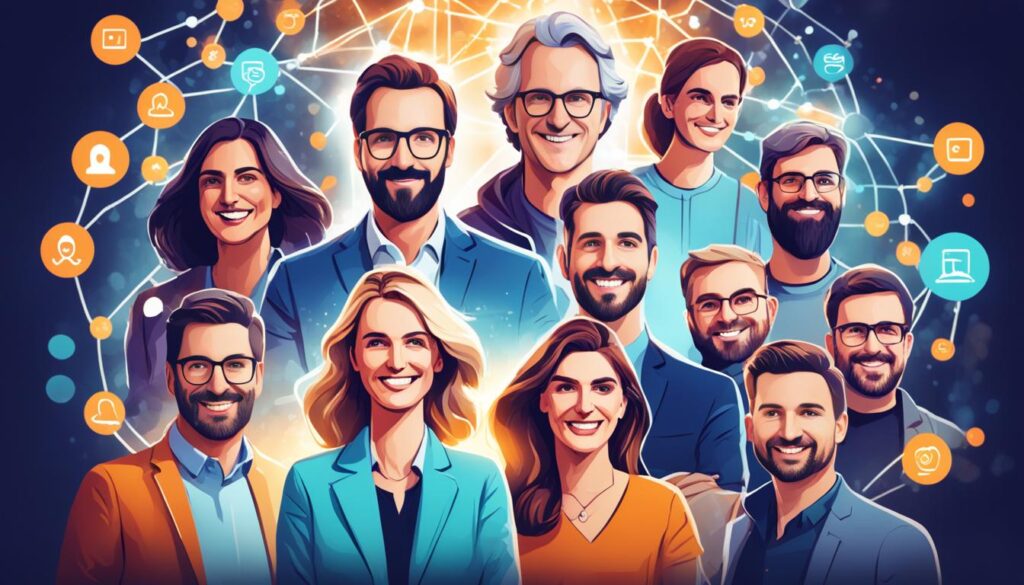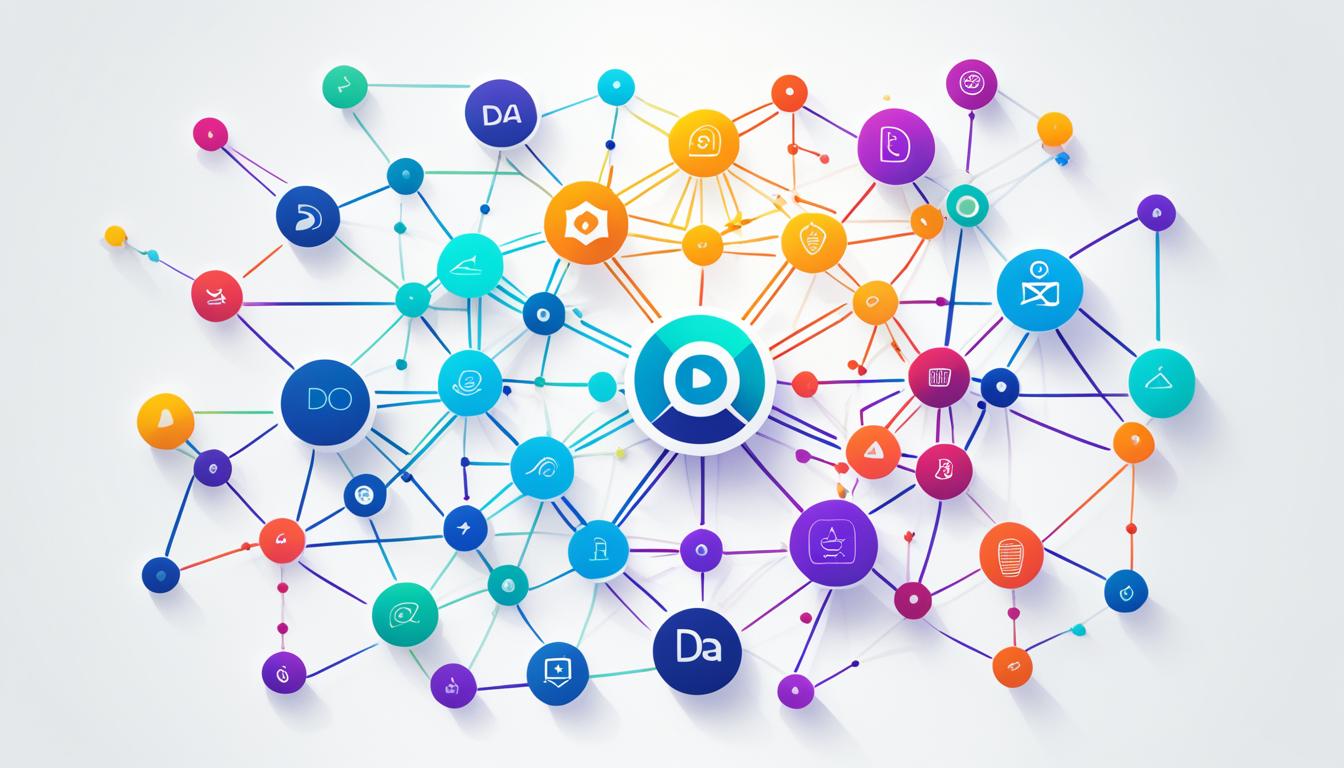Welcome to the world of Decentralized Autonomous Organizations (DAOs), an innovative approach to community governance powered by blockchain technology. In this digital era, DAOs have emerged as a novel model for collaborative decision-making, enabling communities to collectively manage funds and shape the direction of their organizations.
DAOs embody the principles of transparency, trust, and community involvement, fostering a sense of ownership and shared responsibility among their members. By harnessing the power of blockchain technology, DAOs provide a secure and efficient platform for decentralized decision-making.
Within the blockchain ecosystem, DAOs have gained traction as a means to drive community-driven initiatives, ensure fair distribution of resources, and foster innovation. They serve as catalysts for building strong networks and unleashing the potential of decentralized collaboration.
Key Takeaways:
- DAOs are organizations governed by community members and operate on blockchain technology.
- They enable decentralized decision-making and collective management of funds.
- DAOs are built on principles of transparency, trust, and community involvement.
- Their emergence signifies a new era of community governance within the blockchain ecosystem.
- By leveraging blockchain technology, DAOs offer secure and efficient platforms for decentralized collaboration.
What Defines a DAO?
A decentralized autonomous organization (DAO) is a unique form of online community governed by its members through blockchain technology. DAOs enable decentralized decision-making and the allocation of community funds, promoting trust and transparency within the organization.
A DAO is defined by several key criteria:
- Common Goal: A DAO must have a shared common goal or purpose that its members work towards.
- Decentralized Online Community: DAOs operate as decentralized online communities, connecting individuals from all over the world via the Internet.
- Allocation of Community Funds: DAOs manage a pool of tradable crypto tokens that are used to fund the development and growth of the organization.
- Trust and Transparency: All transactions and decision-making processes within a DAO are recorded on the blockchain, ensuring trust and transparency for all members.
These defining characteristics make DAOs a powerful tool for fostering collaboration, empowering individuals, and creating a more inclusive and participatory form of organizational governance.
“DAOs represent the future of community-driven initiatives, where decentralized decision-making and transparent resource allocation empower individuals to collectively achieve common goals.”
As the global adoption of blockchain technology continues to expand, DAOs are expected to play an increasingly pivotal role in shaping the future of organizations and revolutionizing the way communities come together to pursue shared objectives.

Examples of Successful DAO Projects
Several notable DAO projects have demonstrated the potential of this organizational model. Let’s explore some of these projects:
1. Uniswap
Uniswap is a decentralized cryptocurrency exchange that revolutionizes the way users trade digital assets. Operating through the use of smart contracts and governance tokens, Uniswap allows for seamless peer-to-peer transactions without relying on traditional intermediaries. Its automated market maker (AMM) system enables liquidity providers to pool their funds, facilitating efficient and secure token swaps.
2. MakerDAO
MakerDAO is a leading decentralized autonomous organization that governs the stablecoin cryptocurrency Dai. It utilizes its MKR token for voting and investment purposes, empowering the community to determine the direction and policies of the organization. MakerDAO’s unique stablecoin model aims to maintain price stability through collateralized debt positions and autonomous market mechanisms.
3. ConstitutionDAO
ConstitutionDAO made headlines in its attempt to purchase a copy of the U.S. Constitution through a DAO-funded bid. This ambitious project showcased the collective power of decentralized governance and highlighted the potential for community-driven initiatives to have real-world impact. While the bid ultimately fell short, ConstitutionDAO sparked conversations about the role of DAOs in preserving and democratizing cultural artifacts.
4. MoonDAO
MoonDAO focuses on decentralizing access to space research and exploration. By leveraging the power of DAOs, MoonDAO aims to support innovative projects and technologies in the aerospace industry. This initiative opens up new possibilities for collaborative efforts, enabling a broader range of individuals and communities to participate in space-related endeavors.
5. Decentraland
Decentraland is the first fully decentralized virtual world, powered by the Ethereum blockchain. It allows users to explore, create, and trade in a virtual environment that they collectively own and control. Decentraland demonstrates the potential for DAOs to reshape the concept of virtual reality, offering a decentralized and community-driven alternative to traditional centralized platforms.
6. The DAO
The DAO, although it ultimately faced challenges and failed, holds historical significance as the first high-profile implementation of a DAO on the Ethereum platform. The DAO aimed to create a decentralized investment fund, where token holders could vote on investment proposals. While it encountered security vulnerabilities that led to a contentious hard fork, The DAO set the stage for subsequent iterations and learnings within the DAO ecosystem.
In summary, these examples highlight the diverse applications of DAOs across different industries and their potential to reshape traditional organizational structures.

Advantages and Challenges of DAOs
Decentralized Autonomous Organizations (DAOs) offer a range of advantages that are transforming the way communities collaborate and make decisions. From borderless collaboration to organizational transparency and participatory decision-making, DAOs empower individuals and foster a sense of community ownership.
Borderless Collaboration: DAOs enable collaboration across geographical borders, allowing individuals from different parts of the world to come together and work towards a common goal. This borderless approach encourages diversity and brings together a wealth of perspectives and expertise.
Organizational Transparency: Unlike traditional organizations, DAOs operate on blockchain technology, which provides a transparent and immutable record of all transactions and decision-making processes. This transparency fosters trust among community members and ensures accountability within the organization.
“DAOs enable collaboration across geographical borders, allowing individuals from different parts of the world to come together and work towards a common goal.”
Participatory Decision-Making: DAOs give every community member a voice in decision-making processes. Through voting mechanisms and governance tokens, participants have the power to influence the direction of the organization and shape its future.
However, DAOs also face challenges that require careful consideration and management.
Legal and Regulatory Issues: As a relatively new phenomenon, DAOs pose legal and regulatory challenges that are yet to be fully resolved. Questions surrounding liability, taxation, and jurisdiction need to be addressed to provide clarity and establish a solid legal framework for DAO operations.
Technological Infrastructure: The technological infrastructure required to support a DAO can be complex and demanding. Robust and secure blockchain networks, smart contract development, and user-friendly interfaces are essential components that need to be carefully designed and maintained.
Cybersecurity Breaches: Given the digital nature of DAOs, they are susceptible to cyber threats and hacking attempts. Safeguarding the organization’s funds, sensitive data, and community members’ identities is of utmost importance and requires robust cybersecurity measures.
DAOs offer numerous advantages in terms of collaboration, transparency, and community participation. However, to harness these benefits effectively, it is crucial to address the challenges they present. Ongoing efforts in resolving legal and regulatory issues, strengthening technological infrastructure, and implementing robust cybersecurity measures will ensure the smooth operation and growth of DAOs.
The Growth of DAOs
The recent growth of DAOs has been remarkable, fueled by the rapid expansion of the DeFi (Decentralized Finance) and NFT (Non-Fungible Token) markets. These innovative decentralized autonomous organizations have gained significant traction, attracting a diverse range of participants and transforming the way communities collaborate and make decisions.
One notable development in the recognition of DAOs as legitimate entities comes from the states of Wyoming and Tennessee. Both states have enacted legislation that acknowledges the legal status of DAOs, offering a regulatory framework for these unique organizations to operate within. This recognition provides a solid foundation for DAOs to establish themselves and attract more participants, boosting investor and community confidence.
As the popularity of DAOs continues to soar, notable projects have emerged, showcasing the power and potential of this organizational model. Let’s take a closer look at some of these projects:
- Uniswap: A decentralized cryptocurrency exchange powered by DAO governance, Uniswap facilitates seamless and secure token swaps while allowing participants to actively engage in protocol development.
- MakerDAO: Known for its governance over the stablecoin Dai, MakerDAO utilizes the MKR token for voting and investment purposes, enabling the community to collectively manage the stability and value of Dai.
- ConstitutionDAO: This unique DAO made headlines when it aimed to purchase a rare copy of the U.S. Constitution through a community-funded bid, demonstrating the potential of DAOs for collective action beyond the digital realm.
- MoonDAO: With a focus on decentralizing access to space research and exploration, MoonDAO leverages DAO principles to foster collaborations and empower individuals in the space industry.
- Decentraland: As the first fully decentralized virtual world, Decentraland provides users with ownership and governance rights over digital assets and virtual land, transforming the way people interact and create in virtual environments.
- The DAO: Though it faced challenges and ultimately failed, The DAO played a pivotal role in bringing DAOs into the mainstream spotlight, showcasing both the potential and pitfalls of this innovative organizational model.
In addition to the notable projects, various DAO service providers have emerged, offering a range of tools and platforms to facilitate the creation and management of DAOs. These service providers play a crucial role in supporting the growth of DAOs by providing technical infrastructure, governance frameworks, and advisory services to empower DAO communities.

| State | Legislation |
|---|---|
| Wyoming | Recognizes DAOs as legal entities and provides regulatory framework for their operation. |
| Tennessee | Enacts legislation to acknowledge the legal status of DAOs. |
The future of DAOs looks promising, with their recent growth and recognition paving the way for continued innovation and adoption. As more industries and communities embrace the power of decentralized governance and collaborative decision-making, DAOs have the potential to reshape traditional organizational structures and usher in a new era of inclusive participation and empowerment.
The Future Potential of DAOs
Decentralized Autonomous Organizations (DAOs) have the potential to revolutionize traditional organizational structures, shaping the future of human organization. With their disruptive potential and unique characteristics, DAOs empower communities and individuals, enabling joint investment and the distribution of profits.
DAOs offer a new paradigm of organizational structure that challenges the traditional top-down approach. Instead, decision-making is decentralized, allowing community members to actively participate and contribute to the growth and development of the organization. Through blockchain technology, DAOs ensure transparency, trust, and accountability.
One of the key advantages of DAOs is the ability to pool resources through joint investment. Contributors can participate in projects they believe in, aligning their interests with the organization’s objectives. This not only fosters a sense of ownership but also drives innovation and collaboration.
The distribution of profits within DAOs is a fundamental aspect that sets them apart. Unlike traditional organizations where profits are typically concentrated in the hands of a few stakeholders, DAOs aim to distribute profits more equitably among community members. This encourages active engagement and incentivizes individuals to contribute their skills and resources.
DAOs have already shown their disruptive potential in various industries. They have been used to crowdfund projects, manage decentralized networks, and facilitate community-driven initiatives. As DAOs continue to evolve and adapt to changing needs, their potential for driving positive change and transformation in society is immense.
The Benefits of DAOs
DAOs offer several key benefits that make them attractive to individuals and communities:
- Empowerment of communities through decentralized decision-making and governance.
- Increased transparency and accountability through blockchain technology.
- Opportunities for joint investment and participation in projects.
- Fair distribution of profits among community members.
- Promotion of collaboration and innovation.
These benefits make DAOs a compelling model for the future, capable of driving significant changes in the way organizations are structured and operated.

| Traditional Organizational Structures | DAOs |
|---|---|
| Centralized decision-making | Decentralized decision-making |
| Concentration of power and profits | Fair distribution of profits among community members |
| Limited community participation | Active community engagement and collaboration |
| Opaque and closed governance | Transparent and accountable governance through blockchain technology |
| Top-down hierarchical structure | Flat and inclusive organizational structure |
DAOs have the potential to transform the future of human organization. By enabling joint investment, empowering communities, and redefining the distribution of profits, DAOs challenge traditional organizational structures and pave the way for a more inclusive and collaborative society.
Conclusion
Decentralized Autonomous Organizations (DAOs) are driving decentralized community building and creating powerful network effects in the emergent Web3 ecosystem. With their decentralized governance and community-driven decision-making, DAOs offer a new paradigm for organizing communities and driving collective action. As blockchain technology continues to evolve, DAOs are poised to play a significant role in shaping the future of decentralized networks and community-driven initiatives.
DAOs provide a platform for decentralized community building, enabling individuals from across the globe to collaborate and contribute to a common goal. Through the transparent and trustless nature of blockchain technology, DAOs foster a sense of inclusivity and belonging, empowering participants to actively engage in decision-making processes. The network effect created by DAOs amplifies their impact, attracting more participants and resources, further strengthening the community.
Looking ahead, the future of Web3 is intricately tied to the growth and development of DAOs. As blockchain technology becomes more mature and scalable, DAOs have the potential to revolutionize various industries and sectors. We can envision DAOs driving innovation in finance, governance, art, and beyond, as they continue to facilitate collaboration, joint investment, and the distribution of profits in a peer-to-peer manner.
As we embrace the disruption brought about by DAOs, it is important to address the challenges they face. Legal and regulatory frameworks need to adapt to the unique characteristics of DAOs, ensuring clarity and accountability. Likewise, robust technological infrastructure and cybersecurity measures are crucial to protect the assets and interests of DAO participants.
In conclusion, DAOs are not just a buzzword, but a transformative concept that has the potential to reshape the future of decentralized community building. By leveraging the power of blockchain technology, DAOs empower individuals, foster collaboration, and enable collective decision-making. As we navigate the evolving landscape of Web3, DAOs will continue to be at the forefront, driving innovation, and shaping the way communities organize and thrive in a decentralized world.
FAQ
What is a DAO?
A DAO, or decentralized autonomous organization, is an organization that operates on blockchain technology and is governed by community members. It allows for decentralized decision-making and collective management of funds.
How does a DAO operate?
DAOs operate as decentralized online communities connected via the internet. They manage a pool of tradable crypto tokens used to fund the development of the organization, and all transactions and decision-making processes are recorded on the blockchain.
Can you provide examples of successful DAO projects?
Some notable DAO projects include Uniswap, a decentralized cryptocurrency exchange, MakerDAO, which governs the stablecoin cryptocurrency Dai, ConstitutionDAO, which attempted to purchase a copy of the U.S. Constitution, MoonDAO, which focuses on decentralizing access to space research and exploration, and Decentraland, the first fully decentralized virtual world.
What are the advantages and challenges of DAOs?
DAOs offer advantages such as borderless collaboration, organizational transparency, and participatory decision-making. However, they also face challenges such as legal and regulatory issues, complexity in technological infrastructure, and cybersecurity risks.
How has the growth of DAOs been in recent years?
The popularity of DAOs has surged, driven by the growth of the DeFi and NFT markets. Many DAO treasuries have seen a significant increase in funds, and the number of holders has multiplied. Some states, like Wyoming and Tennessee, have enacted legislation recognizing DAOs as legal entities.
What is the future potential of DAOs?
DAOs are seen as the future of human organization, with the potential to disrupt traditional models. They enable joint investment and the distribution of profits, empowering communities and individuals. DAOs are expected to continue evolving and playing a significant role in decentralized networks and community-driven initiatives.








